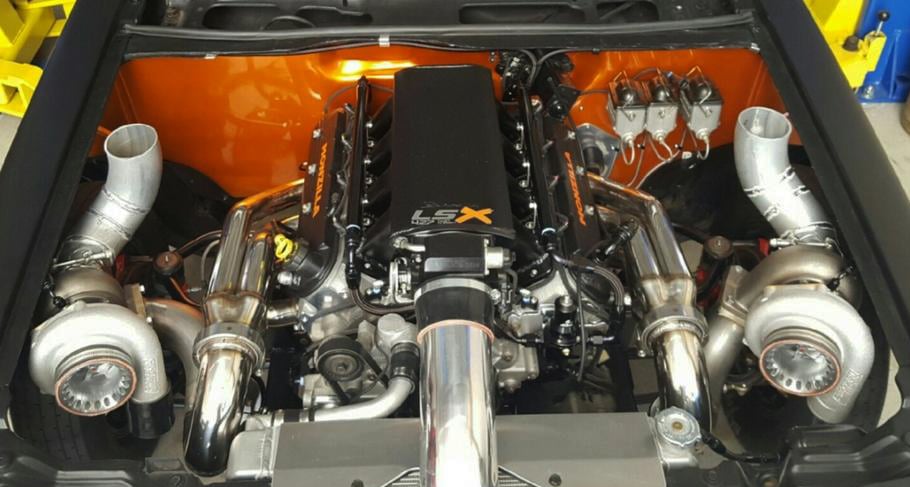Sign up now to join the JEGS email newsletter and be the first to learn about new products, special deals and e-mail only offers!

If you own a classic car, chances are it's equipped with a carburetor-based fueling system. While carburetors served as the standard technology in the past, electronic fuel injection systems, commonly known as "EFI," have become prevalent in modern vehicles over the last two decades. In this article, we'll delve into the EFI basics, the advantages it offers, and what you should know about installing EFI on your classic car.
Electronic Fuel Injection (EFI) is a technology rooted in the 1970s that utilizes solenoid valves to precisely meter fuel delivery. Over time, EFI has evolved to offer unparalleled precision, surpassing even the best carburetors. EFI systems rely on injectors fed with pressurized fuel, delivered by a high-pressure pump and fuel lines. Filters play a crucial role in keeping impurities and particles from clogging the injectors.
EFI brings a range of advantages to the table, making it an appealing option for classic car enthusiasts:
EFI's ability to adjust parameters based on temperature conditions ensures smooth cold starts, eliminating the need for priming or adjustments on chilly mornings. This not only saves time but also improves fuel economy.
EFI systems provide better fuel economy and smoother power delivery, optimizing your classic car's performance. Additionally, they are well-suited for forced induction methods like turbocharging and supercharging, as the control unit dynamically adjusts fueling parameters on the fly.

Sign up now to join the JEGS email newsletter and be the first to learn about new products, special deals and e-mail only offers!

The fuel pump is a critical component of an EFI system as it pressurizes the fuel for delivery to the injectors. Unlike modern direct-injection systems with extreme pressures, installing EFI on your classic car won't require dealing with such high pressures.
EFI systems rely on a network of fuel lines to transport fuel from the tank to the injectors. The type of EFI system determines the required fuel lines. Non-return EFI systems deliver fuel directly to the injectors via a fuel pump and pressure regulator, while return EFI systems incorporate an additional fuel line from the regulator back to the tank. The latter offers advantages in preventing vapor lock and eliminating back-pressure pulses.
Maintaining high-quality fuel filters is crucial for EFI systems to prevent impurities from clogging the injectors over time. Regular filter replacements are necessary to ensure optimal performance.
EFI systems rely on a variety of sensors to precisely control fuel delivery. While EFI systems offer numerous benefits, diagnosing faults can be more challenging than with carburetors. Using an OBD2 scan tool is usually necessary for troubleshooting.
Installing an EFI system requires meticulous wiring for the fuel pump, injectors, sensors, and regulator, all connected to the control unit. Aftermarket kits typically include comprehensive instructions to facilitate installation. Ensure that components are correctly grounded and isolated, and keep EFI system wires away from hot engine components to prevent damage over time.
Despite their advantages, EFI systems can encounter issues. Common problems include sensor failures, wiring issues, and fuel pump problems. Regular maintenance and diagnostics are essential to keep your EFI system running smoothly.
The cost of installing an EFI system can vary widely depending on the make and model of your classic car, the complexity of the EFI kit, and whether you choose professional installation or tackle the job yourself. DIY installations are generally more budget-friendly, but professional installations ensure precision and reliability.
Installing an EFI system yourself is possible, especially with the availability of comprehensive EFI conversion kits. However, it requires mechanical skills, wiring expertise, and the right tools. If you're confident in your abilities, a DIY EFI installation can be a rewarding project.
At JEGS, we offer a wide range of EFI kits and components, including the popular Holley Sniper EFI kit, designed to make your classic car perform at its best. With over sixty years of experience, competitive pricing, expert advice, and full after-sales service, JEGS is your one-stop performance parts shop. Join our community of satisfied customers and take your classic car to the next level with EFI technology.




Leave a Reply